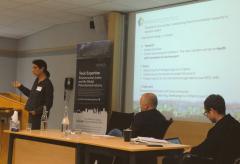
The Role of Civic Society in Addressing Environmental Justice Policy – The case of Israel
Carmit Lubanov
Abstract:
The civic dimension of environmental justice suggests 'Bottom up' action policy, planning in a way that ensures active involvement of citizens, as part of changing the political rules of the game.
The presentation will share AEJI experience in the field of addressing environmental justice policy indicates for the centrality of creating research based data and approaching it to decision makers, in the ability to generate changes.
The new research by AEJI empirically examined the inequality and the state of environmental hazards in five categories: sewage, water, public transportation, air pollution and open spaces. The ‘Environmental justice’ has examined by constructing a database for all municipalities and local councils in the country, with aim to draw practical conclusions. The findings clearly indicate that a) Environmental injustice is identified with Arab towns and villages, noticeable in socio-economic clusters that particularly lower (1-4 of 10). b) The economically vulnerable communities are often the most subject to environmental risks. Those communities lag behind in empirical data and scientific literacy, legal and advocacy capacity, and access to information.
This situation presents particular challenges for us as civic initiator of the research to addressing those communities’ environmental problems to the local, regional and national governance.

